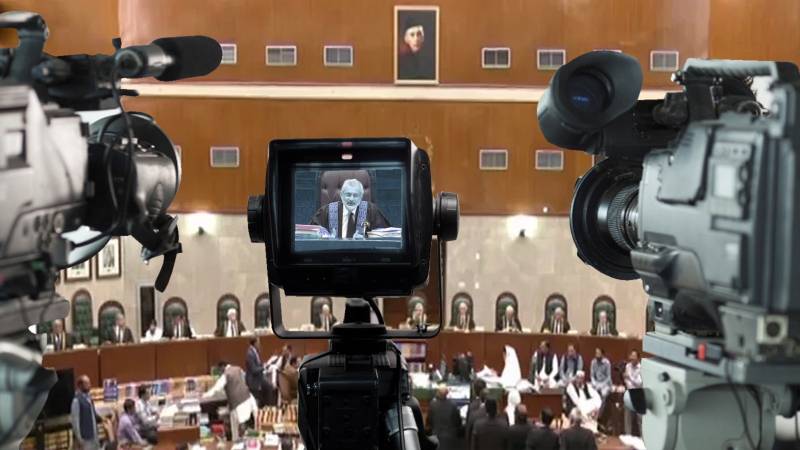
The Supreme Court has observed that there is a real probability that hearings into the appeals on the National Accountability Bureau (NAB) law amendment case may be misused for political purposes and point scoring.
The top court made these observations in a written order rejecting a request by the Khyber Pakhtunkhwa (KP) government to livestream proceedings in the NAB law amendments case.
"However, when the head of a political party wants to be heard, who is not an advocate of this court, there is a real probability that these hearings may be used for political purposes and point scoring and in respect of matters which do not concern these appeals," the top court observed, adding, "this was a paramount
consideration when we had dismissed the application."
A five-judge larger bench, headed by Chief Justice Qazi Faez Isa, had heard the request filed by the KP government and had summarily dismissed the request through a majority 4-1 decision (with Justice Athar Minallah dissenting). The court's decision came after members of the bench deliberated on the request behind closed doors, without hearing the counsel for the KP government or the Attorney General of Pakistan.
The court explained their reason for rejecting the applications, noting that their apprehensions regarding the live streaming request proved correct later in the day when Pakistan Tehreek-e-Insaf (PTI) founder Imran Khan Niazi, while addressing the court, referred to other cases which the SC believed had nothing to do with the subject matter of the appeals being heard.
"This cannot be permitted as it would thwart the proper administration of justice," the top court observed.
"Commenting on matters not under consideration may affect public perception," it further said, adding that the rights of those who are not before us, including their fundamental right to a fair trial and due process, may also be affected.
The top court also addressed the KP's contention for live streaming the case, noting that the only reason the KP government had cited in support of its application was that the 'non-live showing of only the instant case amongst others is discrimination.'
"However, the reason is factually incorrect because only a very few cases have been/are live-streamed," the top court clarified in its six-page written order.
"There are also instances of cases which were initially live streamed, but in the interest of justice, it was discontinued," the order said.
It added that KP's application does not cite any law in support of its request, nor does it say how the provincial government was being denied equality or equal protection of the law.
"Therefore, on this ground alone, the said application could be dismissed, but we did not do so and have decided it on merits."
The written order also revealed that a Committee comprising Justice Muhammad Ali Mazhar and Justice Athar Minallah, constituted to finalise modalities for live streaming of proceedings, submitted a report stating therein that the committee could only devise standard operating procedures (SOPs). The order further revealed that the committee has yet to develop the SOPs.
For the first time in its history, the top court started live broadcasts of case proceedings on September 18, 2023, and since then, key cases of public interest have been live-streamed on the internet. So far, the court said, 40 hearings have been live-streamed.
"This initiative was taken to provide to the general public and lawyers throughout Pakistan direct access to the courtroom in respect of matters of public interest," the court said, adding that their objective with live-streaming cases was manifold, including: educational, promoting openness and transparency in judicial process, forestalling misreporting or one-sided reporting, facilitating lawyers on how best to articulate their propositions, how to effectively conduct cases and how to behave in the courtroom.
"However, in live-streaming cases, there is always a possibility that the facility may be misused or exploited for ulterior or personal purposes. There is also the possibility of grandstanding while the nation watches. This court must be vigilant against such misuse and/or exploitation."
The top court further said that of the 53 hearings held for the NAB amendment case, Imran Khan did not personally attend a single hearing.
"And, neither he, the government of Khyber Pakhtunkhwa, nor any other party requested to live broadcast/stream the hearings," the top court said.
The top court said that when appeals were filed in the case against the September 15, 2023 judgement, Imran Khan was served a notice in jail since he was incarcerated in the Toshakhana case. Imran Khan had argued that he would represent himself in the case.
On May 30, 2024, Imran Khan requested counsel access and said he wanted to consult with Senior Advocate Khawaja Haris Ahmad.
"We directed that whenever the said learned senior advocate wants to, he, along with two other lawyers, may meet Mr. Niazi with regard to these appeals."
The court noted that a request to allow Imran Khan to appear in the case via video link was initially allowed when he was representing himself. However, after appointing a counsel and being represented, he no longer needs to be provided with the video-link facility. "However, this facility is being continued."
The court also contested the premise of the request to live-stream the case, arguing that the public has shown little or no interest in whether the amendments made to the National Accountability Ordinance (NAO) 1999 are sustainable on the constitutional plane. "Nonetheless, this court, on its own volition, was live-streaming the hearing of these appeals."
"In conclusion, we would like to add that while a request to live broadcast or live stream may be submitted and may also be objected to, it is clarified that this, as matters presently stand, is in the exclusive domain of this court."

